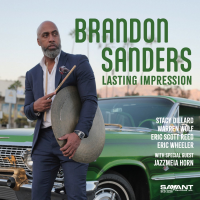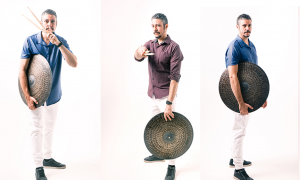Home » Jazz Articles » Interview » Checking in with Chick
Checking in with Chick
Throughout his career Corea has maintained a connection to Latin music. It's well known that, as a young musician, he worked in Mongo Santamaria's band and with others in the Latin scene. Corea himself made the point more bluntly years later with his album My Spanish Heart. Yet, what seems to me to be an under-examined aspect of his later music is a marked return to Latin sounds. If one listens carefully, this strain is unmistakably present in a lot of his music since the 60s, including his latest work.
Having been in on jazz fusion's beginnings in the 70s with Return to Forever, which blended jazz with classical, Latin, and other styles in a highly original manner, Corea returned to fusion a decade later, launching his Elektric Band's debut recording in 1986 and quickly releasing two more in the succeeding years. Jazz purists were mostly dismissive of these records, but they sold well and Corea stayed with the Elektric Band, releasing two additional albums of new material and a live recording before retiring that group, only to return a few years later with a new incarnation of the quartet. His latest Elektric Band release, To the Stars, based on the L. Ron Hubbard science fiction novel by that title, is perhaps Corea's message to the planet: "Get over it, purists. I'm going to keep doing this stuff!" He has reinstated the flashy guitarist Frank Gambale, John Patitucci (who, since leaving the original Elektric band has become one of jazz's busiest bassists), and the nimble Dave Weckl on drums.
The Elektric Band has dominated Corea's discography since 1986, and it dominates his thoughts today. I met with him at the recording studio in Sirius Satellite Radio's impressive Rockefeller Center facility. Copies of To the Stars, the CD, the L. Ron Hubbard novel, and an audio book version, all clad in metallic silver packaging, were arrayed on a coffee table nearby, materially emphasizing the main topic on Corea's mind these days. He had performed a few nights before at Lincoln Center's free Out of Doors series. Scientology is another topic Corea is more than willing to discuss. As we talked about the new record, L. Ron Hubbard and other topics, I noticed Chick still has his Boston accent, pronouncing art "aht" and New York "New Yahk." When something is said that registers strongly with him he snaps two fingers sharply and points as he seizes on the topic. In his sixties, his torso has expanded and rounded, one of the few outward signs of his success, and his longish hair is as much salt as pepper, but he shows no other serious signs of aging. He radiates a calm energy, and has the comportment of a well-liked university professor.
All About Jazz: You've been interviewed many times. What do you like to talk about?
Chick Corea: To be blatantly honest with you, the reason why I do interviews is to, mainly, let the public know what I'm doing, kind of like a newsletter. Right now I'm thoroughly immersed in this live performance music you heard the other night.
AAJ: With the exception of the space interludes, I heard a lot of Latin music in the record. I haven't listened to much fusion in a while, so I was hearing it fresh and didn't have much attitude or prejudice about it. What struck me was that some of it sounds like accomplished microtonal composing. I've heard you're a fan of Bartok.
CC: There are so many technical elements that go into making what you heard in the live performance, hundreds, maybe thousands that we could focus on, like the styles and rhythms, the orchestration, the fact that there's an electric guitar, etc. My comment on all this is that the best way to listen and understand music is just to listen to it real straight and try to get what it is and how it affects you rather than try to put it in a box. I personally don't know what to call this music. Call it what we want: jazz, fusion, rock, easy, hard, light, backwards, forwards. The music is constructed with a good deal of composition. Its definitely scored, but then we open up and improvise.
AAJ: A lot of people have a real problem with electric jazz, preferring the acoustic stuff. What if you scored this same music for a classical ensemble, with cellos, etc.? Do you think it would get more respect?
CC: Let's get a few rules straight in art. Let's go down to basics. Let's say a truth, which is that everyone has his own viewpoint about what beauty is. What that means to me is not every individual is gonna have the same opinion about what he likes and doesn't like. So for me the first rule of art, you could call it a human right, is that every individual is free to appreciate the world around him in the way he sees, and no one's wrong. This guy likes electric music, this guy likes acoustic music, cool on both of them! I think this music is getting a tremendous reception everywhere we go.
AAJ: Many critics and jazz connoisseurs turn their noses up at fusion, but the public seems to love it.
CC: You know what I do with critics? Not just professional ones but amateur ones, like my aunt. I ignore them.
AAJ: Maybe that's best way, unless there is someone who has criticism that can help you.
CC: Naahhh! You can print that.
AAJ: One of my favorite groups was the trio with Roy Haynes and Miroslav Vitous. It's exquisite stuff. Do you ever plan to reprise that trio?
CC: I think it's mostly finished. We had a birthday reunion in 2001. I put Roy Haynes back with Miroslav and we played two really fun nights together at the Blue Note. In fact the tune "Matrix" that we recorded newly at the Blue Note after so many years one a Grammy for best instrumental solo!
AAJ: Let's talk about Circle. It seems to me that was a direction you went in and decided not to go further.
CC: Circle was a great, great band. I had a ball. We played for a year-and-a-half. Dave and I had a very strong musical connection and we were pursuing a way of improvising that was very invigorating to me at that time. All what happened to me was, we performed a lot, my mind was changing and I wanted to try some different stuff, and so I did. I wanted to make a different kind of music. Dave and Anthony and Barry wanted to continue with Circle, and so it was an amicable parting.
Have you heard the new record?
AAJ: Yes! But can I ask you about your classical influences? What about Messiaen?
CC: Sure, I love Messiaen. I like to listen to a lot of stuff and let it all creep in.
AAJ: After Circle dissolved, you made a statement that you wanted to go back to the musical forms that you originally loved. I hear a lot of Latin influence in your later work, including the new record. Is this an early influence that you left and returned to?
CC: In high school I began to play in Latin bands. I was always attracted to Latin rhythms, Spanish-speaking musicians, and when I got to New York one of my first big gigs was with Mongo, and still to this day I really feel that the Latin cultures are kind a of a basis with me, I connect with it a lot. But when I put musicians together I try to piece together the music that seems to fit the message. That's what I did with "To the Stars." I put together all kinds of elements that seemed to fit what I was after to tell the story in the book.
AAJ: Can you talk about the book?
CC: This is the last of approximately 250 fiction novels that Hubbard wrote in the 30s and 40s. he was one of the most popular pulp writers during that era. He really turned out the stories. I became an intense fan of his early on, first with his book "Dianetics" and what he wrote on Scientology, but then later on with his fiction work. I've been through this book eight or nine times. This was one of the last books he wrote in '49 before going completely into the development of Dianetics and Scientology. Later, toward the end of his life in the 80s, he wrote "Battlefield Earth" and "Mission Earth," two amazing books, but I kept coming back to "To the Stars." It has as one of its themes what is referred to as "the time dilation theory" by Einstein, which says that when a body, in this case a space ship with people on it, travels close to the speed of light, which is 186,000 miles per second, this time phenomenon happens, where, for the people on the ship time starts reducing to zero, whereas on Earth time keeps moving forward, so they go out on a journey for a couple weeks or a month and when they return to Earth a couple hundred years have passed. The story is about what happens when these people on these trips, called "the long passage," return to Earth.
AAJ: Check Blast" feels like this big surge of speed and energy needed to escape Earth's gravity.
CC: No! "Check Blast" is very specific in the book. There's this theory that if the ship reaches the speed of light it could freeze, so they want to keep it below 186,000 miles per second. They have this speedometer and if the ship is moving too close to light speed the crew, whoever's awake on the bridge, has to alert the engineer, yelling out "check blast 1000" or "check blast 500." There's a point in the music where the keyboards go "bing, bing, bing." That's the check blast warning.
AAJ: So this could be the soundtrack to the movie one day?
CC: No! Soundtracks are very different from this kind of music. Soundtracks are to serve the needs of the film. This music is a tone poem. It sits all by itself. It's to be listened to all by itself. It could, for the listener, expand what he feels and understands in the story.
AAJ: Would you be interested in scoring a movie version of "To the Stars?"
CC: Yes, I would. I'd give that a good try.
AAJ: You live in Florida?
CC: Yes, in Clearwater.
AAJ: Sam Rivers lives in Florida. Have you two ever worked together?
CC: I haven't seen him for quite a while. He's an amazing man. We hooked up about five years ago and did some things together. He had a trio and I had a band and we jammed together.
AAJ: The Lincoln Center concert was the second stop on the tour. Now what?
CC: We're moving on to Atlanta to play at the largest Science Fiction conference in the world, called DragonCon.
AAJ: I've been to that!
CC: Really! Was it wild? Did you dress up?
AAJ: It was pretty wild. No, I didn't dress up. I notice you switch back and forth from acoustic to electric keyboards. This gives you a wide range of sounds.
CC: My basic axe is the piano, but for the Elektric band the sounds are surrounding the fender rhodes and clavinet sounds and the sounds I developed in the 80s to create different moods. If I had to eliminate anything due to space or economy I'd have to get rid of the piano.
AAJ: I know nothing about Scientology.
CC: Hubbard was a great artist himself. One way to learn about Scientology is to know who Ron Hubbard was. He was a great man.
AAJ: Did you know him personally?
CC: We exchanged some really nice letters. I used to write to him and thank him for his work. Later on I sent him a couple records and he wrote back and was very encouraging. He was an amazing man and had an amazing life. His life was an adventure. His biography is being compiled and Im dying to see it, but I know bits and pieces about it. He talked a little about his life in his lectures, and he was wise enough to, as he developed Dianetics and Scientology, to tape his lectures so those who want hear him speak about them directly can do so. The aims of Scientology is a world without war, without insanity, where honest people can be safe to work. Scientology is in back of all the basic human rights that we have. But the brilliant thing is that Hubbard came up with techniques and ways that people could study and produce good human results on themselves, their families and friends, and some of these techniques are now being used in amazing public programs. We have a program called "Narc-Anon" that's been in action for 20-30 years. It's the very best drug program ever. It doesn't use any drugs. What it does beyond helping the person off drugs is it gets back to why he got on them in the first place. It rehabilitates his sense of self-respect so he can attack life the way he wants to. We have a program called "Crim-Anon" where people who've been put in prison, who are pushed out of society, can rehabilitate themselves and their self-respect. These programs are incredibly effective, so much so that finally governments are starting to take note and support some of them. That's just some of the outreach of the subject, which is about personal freedom and awareness. Hubbard felt that artists were incredibly important to the health of our culture, and actually a way that you can measure the health of a culture is how active it is in the arts. The reverse of that is that any culture that we've seen that goes downhill immediately starts to put down art. So the opposite of that is what we look for.
AAJ: So, music reflects the state of the culture as a whole?
CC: Not so much the type of music because in a free society there needs to be all types of music. The real monitor is how much music is there, how many people are artists, how many concerts are there, how many young people can go into art. That really is a gauge of how healthy a society is.
AAJ: Do you try to put these ideas into practice musically? Is it important to you that your sidemen have these values?
CC: The values that Scientology states are universal values. Values that any good mother or father or friend couldn't possibly disagree with. They're the values of health and improvement. It's not a belief system where you have to sign up and believe something particularly. People of all religions study Hubbard, and Hubbard himself encouraged religions to flourish because in our day and age, in our mechanized society, what is lacking is the humanities and people with faith and beliefs. So that's one of our operations. We encourage that. I require a certain amount of ethics from anybody I work with.
Tags
PREVIOUS / NEXT
Support All About Jazz
 All About Jazz has been a pillar of jazz since 1995, championing it as an art form and, more importantly, supporting the musicians who make it. Our enduring commitment has made "AAJ" one of the most culturally important websites of its kind, read by hundreds of thousands of fans, musicians and industry figures every month.
All About Jazz has been a pillar of jazz since 1995, championing it as an art form and, more importantly, supporting the musicians who make it. Our enduring commitment has made "AAJ" one of the most culturally important websites of its kind, read by hundreds of thousands of fans, musicians and industry figures every month.
























